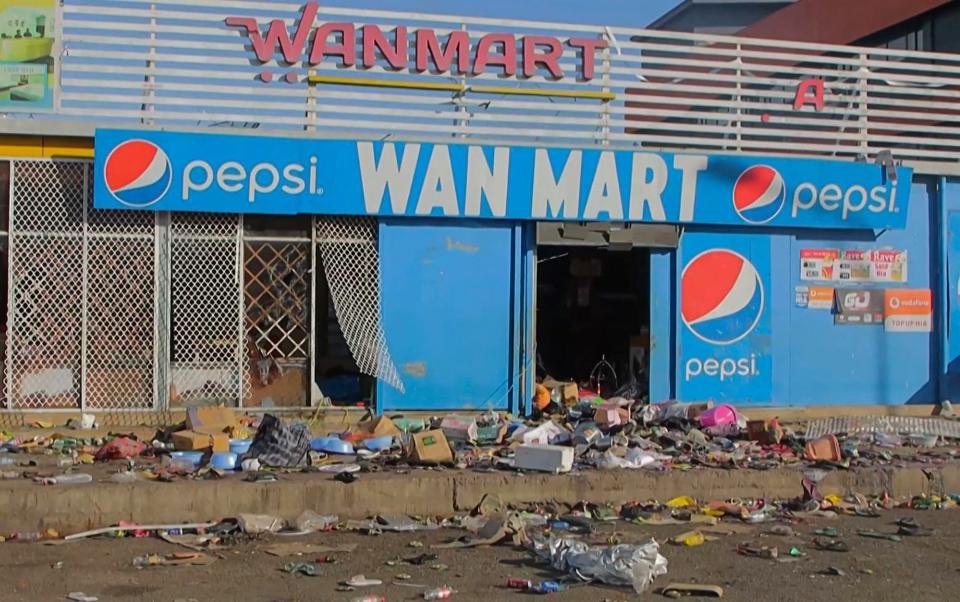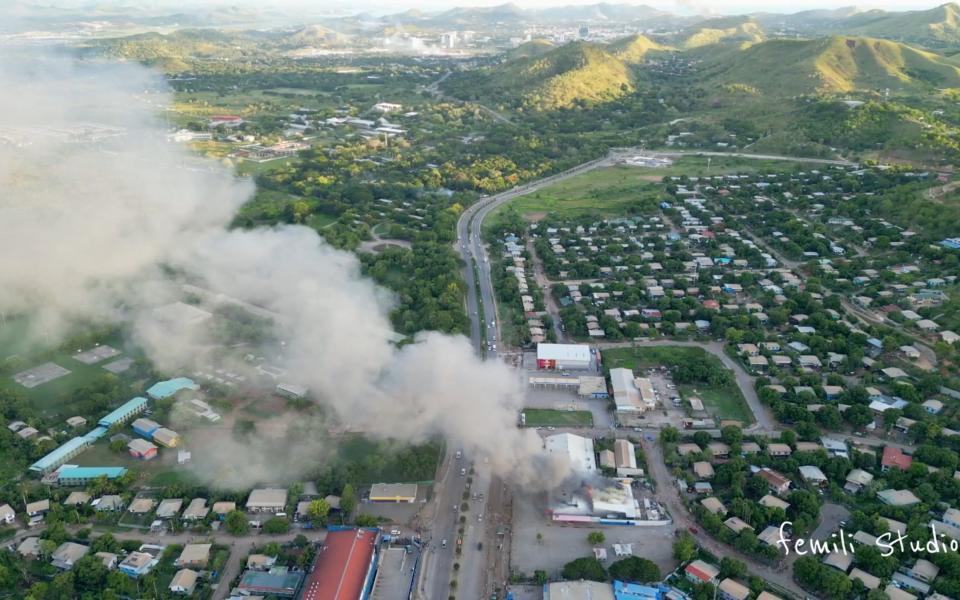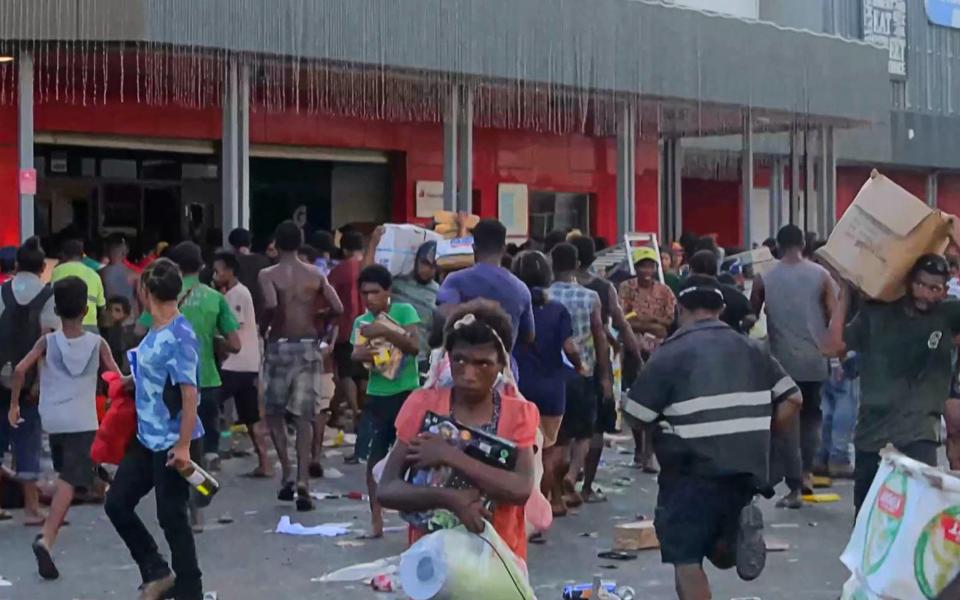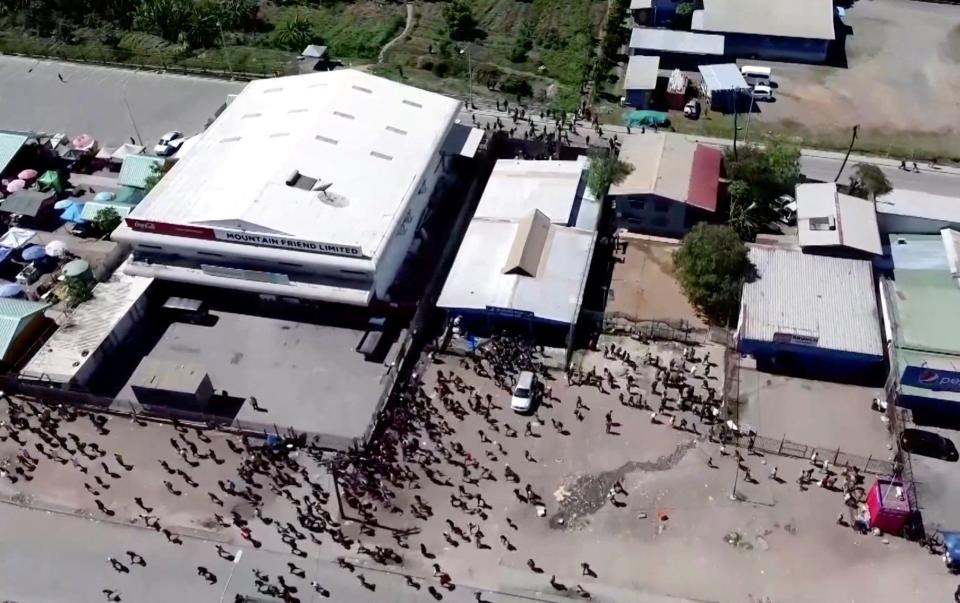Sixteen die in Papua New Guinea riots as police and soldiers go on strike
- Oops!Something went wrong.Please try again later.
Sixteen people died in rioting in Papua New Guinea after police, soldiers and prison guards went on strike over a pay glitch.
Thousands took to the streets of Port Moresby, the capital, prompting the Pacific island nation’s prime minister to declare a 14-day state of emergency on Thursday.
One looter was seen carrying a fridge-freezer on his shoulders as rioters set fire to buildings, sending plumes of black smoke drifting over the city, and ransacked shops.
Nine people died in the violence in Port Moresby, where a group gathered outside the prime minister’s office tore a security gate off its hinges and set fire to a police car.
Within hours, the unrest had spread to the second city of Lae, about 186 miles to the north of the capital, where seven people were killed in clashes.


The violence came after a technological malfunction resulted in the wages of security forces being docked. Amid rumours that the pay cut was deliberate, or even some sort of new tax, police officers, soldiers and prison guards went on strike.
The Post Courier, a national newspaper, said Wednesday’s unrest marked “the darkest day” in Port Moresby’s history, adding that police had stood by as looters and hooligans ran rampant in an “unprecedented” crime spree.
The main hospital in the capital treated 25 people suffering from gunshot wounds, as well as six injured by bush knives or machetes.
Violence in the city subsided on Thursday, with authorities flying in police and military reinforcements to maintain order.
James Marape, the prime minister, said he had suspended Papua New Guinea’s chief of police and senior bureaucrats in the finance and treasury departments while the government conducted a review into the cause of the riots. He also promised to fix the pay packet problem for public servants.
“There was evidence of organised rioting that took place,” Mr Marape said, adding that the review would ensure “we secure democracy, we secure rule of law”.
He said about 1,000 military personnel were on standby to ward off further unrest amid reports that the violence was spreading to other parts of Papua New Guinea.

The rioting has caused a political crisis in the country and sparked calls for Mr Marape to resign. Critics accused him of being weak and mishandling the situation.
Six MPs have quit his government over the unrest. One of them, James Nomane, accused the prime minister of turning Papua New Guinea into a “banana republic” and said: “Resign for being indecisive and weak. Resign for the country slipping into a banana republic and for this crisis happening under your watch.”
Keith Iduhu, another MP, said Mr Marape had failed to address the grievances of soldiers and police officers. “The core issue surrounding the grievances raised by the disciplinary forces was completely avoidable had it not been for bureaucratic negligence,” he said.

Papua New Guinea has been plagued for decades by poverty, tribal tensions, poor governance and crime. Those problems have been exacerbated by inflation and rising living costs.
About 40 per cent of Papua New Guinea’s nine million citizens live below the poverty line despite the country’s natural resources, including gold and timber.
Port Moresby is routinely listed as one of the world’s least liveable cities, along with Lagos, Karachi and Tripoli.
Located 125 miles from Australia’s northernmost border, Papua New Guinea is the largest and most populous state in Melanesia.
Australia recently signed a security deal with the country, promising to help its stretched police force combat arms trafficking, drug smuggling and tribal violence.
“We continue to urge calm at this difficult time,” Anthony Albanese, the Australian prime minister, said on Thursday.

